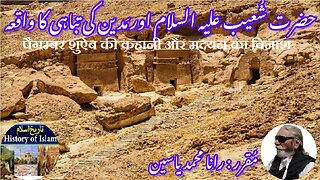Premium Only Content

Biography of Sayyid Abu Bakr al-Adani and tomb | سید ابوبکر العدنانی کی سوانح حیات اور مقبرہ
@islamichistory813 #IslamicHistory #Scholarship #SayyidAbuBakr
Biography of Religious Scholar Sayyid Abu Bakr al-Adani and tomb
Dekhti Aankhooon aur sountay kaanoon ko Asslamoalaikum, In this islamic inforamative video, we are presenting the life of Sayyid Abu Bakr al-Adani ibn Abdullah al-Aydarus, a revered religious scholar whose teachings have shaped Islamic thought. The biography covers his formative years, scholarly pursuits, and the pivotal role he played in promoting Islamic values and knowledge. Through a detailed examination of his works and contributions, viewers will gain a deeper understanding of his significance in the religious landscape. Get to know the enduring legacy of Sayyid Abu Bakr al-Adani in this informative video.
Abu Bakr al-Aydarus, also known as Sayyid Abu Bakr al-Adani ibn Abdullah al-Aydarus was a Hadhrami religious scholar of Sufism and a poet of wrote several Arab poems in the Humayni vernacular style.
Abu Bakr al-Aydarus led most of his adult life in Aden, where he was well respected for his societal contributions to the well-being of the city’s residents. After his death in 1508, he was mourned by the city’s residents and was later venerated as the wali or “patron saint” of Aden.
Abu Bakr al-Aydarus was born in Tarim in 1447. In his youth, Hz. Abu Bakr al-Aydarus studied the teachings of Al-Ghazali. In his early adulthood, he was sent to Aden to undertake missionary duties there. Hz. Abu Bakr al-Aydarus oversaw the construction of the city’s mosque and its Sufi school and later settled down in the city. Nevertheless, he made occasional return trips to his family in Tarim, many of whom relied on monetary endowment given by charitable traders in the region.
Abu Bakr al-Aydarus was eventually made the Mansab (religious leader) of Aden. He was highly respected by the city’s residents, who described him as a very brilliant and kind man with an excellent sense of justice. Hz. Abu Bakr al-Aydarus was also respected by members of the local Jewish community, who provided refuge to the Jews who suffer from occasional harassment from the desert bandits. Hz. Abu Bakr al-Aydarus also travelled to Harar after settling in Aden and introduced the Qadiriyyah Tariqa among the Ethiopian natives.
At least three Arab texts, mention Abu Bakr al-Aydarus role in the introduction of coffee to the Hadhramaut. According to the Ta’rikh of an-Najm al-Ghazzi, Hz. Abu Bakr al-Aydarus became impressed with the strong stimulating effect of the coffee fruit after he ate the berries of a coffee tree during his wanderings. He praised the effects of the coffee fruit, took the coffee berries and introduced them to his disciples. The other two sources, Jami karamat al-awliya and the Istifa’ al-Safwa li-Tashyat al-Qahwa mentioned of Hz. Abu Bakr al-Aydarus fondness of coffee. They accredited him for the introduction of coffee to South Arabia.
He had great concern for the ordinary people, especially those not on the straight path. He said: “If I see a believer who Allah has given the ability to perform that which is incumbent upon him and to avoid enormities, then I am content. What troubles me is when I see a believer who has fallen into disobedience of Allah and into the traps of the Devil, so I expend my efforts to save him.” Knowing that the night is the time when most acts of disobedience are committed, he would gather the people together every night to remember Allah. The gathering would continue until Fajr, at which point he would lead the people in prayer and then give them a day’s wages and tell them to go home and sleep. Their souls thus became accustomed to obeying Allah, and they had no time to disobey Him.
He was famous for his noble character and immense generosity, which led him to accumulate significant debts in order to help the needy. One of his companions rebuked him for accumulating these debts, to which he retorted: “Do not come between me and my Lord, for I have only spent this money seeking His pleasure, and He has promised me that He will pay back these debts before I leave this life.” Every year he set aside money for students of knowledge and visitors. He contributed to many charitable projects, such as the repair of the mosques of Tarim and the construction of drainage channels to prevent flooding in Aden and several areas of Hadhramaut.
The Adenis greatly mourned Abu Bakr al-Aydarus’s death in 1508 (although some source suggested that he died in 1503). The city residents published copies of obituaries commemorating the life of Hz. Abu Bakr al-Aydarus, and an account of Hz.’s birthplace, Tarim was also published. His grave has since been visited by thousands of Muslim pilgrims every year who continue to pay their respects.
After relocating to Aden, Hz. Abu Bakr al-Aydarus raised a family of his own and started a new lineage. The al-Aydarus clan was an offshoot of the Ba ‘Alawiyya as-Saqqaf clan of Tarim, Yemen.
Many of his descendants established trading links with the Bedouins and the Qu’aiti sultans and took up prominent political positions. Other descendants migrated to India, Southeast Asia and East Africa from the late 14th century onwards and established new Islamic schools or Muslim ruling houses; among the first descendants to migrate was a grandson, Abdallah al-Aydarus and another descendant, Abdallah ibn Shaykh al-Aydarus. The latter emigrated to India and Aceh, respectively, and established new diaspora communities.
So sisters brothers friends and elders, tomorow we will be described Biography of Islamic Scholar Sayyidina Ahmad al-Badawi. Allah hafiz
=============
-
 8:19
8:19
ISLAMIC HISTORY
2 days agoStory of Prophet Shuaib and destruction of Madyan حضرت شعیب علیہ السلام اور مدین کی تباہی کا واقعہ
13 -
 3:10:32
3:10:32
Price of Reason
11 hours agoTrump vs NPR & PBS! Kash REMOVES Cartel Members! Death of a Unicorn EARLY Review! Ubisoft is DOOMED!
45.3K15 -
 3:57:21
3:57:21
Alex Zedra
7 hours agoLIVE! Scary Games with the Girls
27K4 -
 6:50:04
6:50:04
The Why Files
6 days agoCOMPILATION: Blorpus & Chill with the Beavers Sleepy Time
57.1K88 -
 3:07:53
3:07:53
TimcastIRL
8 hours agoGOP To ABOLISH The TSA, Defund NPR & PBS, Already ENDED Education Department w/Sargon | Timcast IRL
238K139 -
 1:43:06
1:43:06
Roseanne Barr
10 hours ago $21.09 earnedBit*h Better Have My Money W/ Michael Malice | The Roseanne Barr Podcast #92
69.7K55 -
 3:07:55
3:07:55
IcyFPS
4 hours agoIcy Tackles Rebirth Island, again! Day 3 | Verdansk Soon | New META hunt? |
18.9K -
 1:22:18
1:22:18
Man in America
11 hours agoTECHNOCRACY INC.: Sinister Links Between Musk, USA, and the British Crown?
56.5K33 -
 2:40:30
2:40:30
SlingerGames
6 hours agoThursday Variety Stream!
25.3K4 -
 3:05:53
3:05:53
SIMSIM GT
7 hours agoConvoy | Truck Simulator | TRIPLE 55INCH SETUP | GOPRO POV |
41.3K3